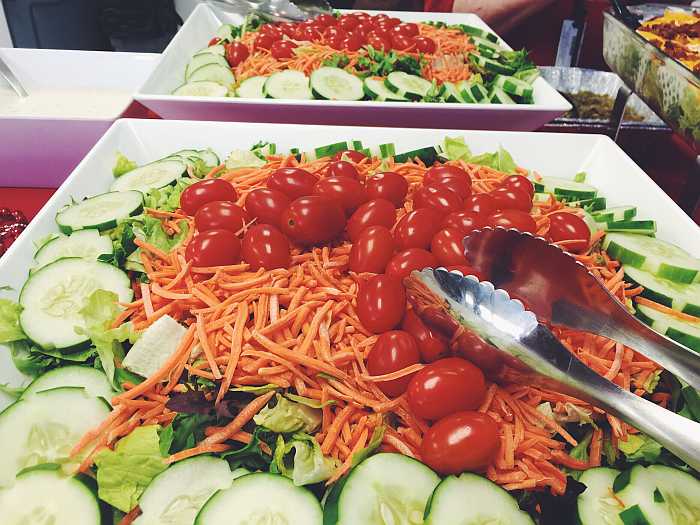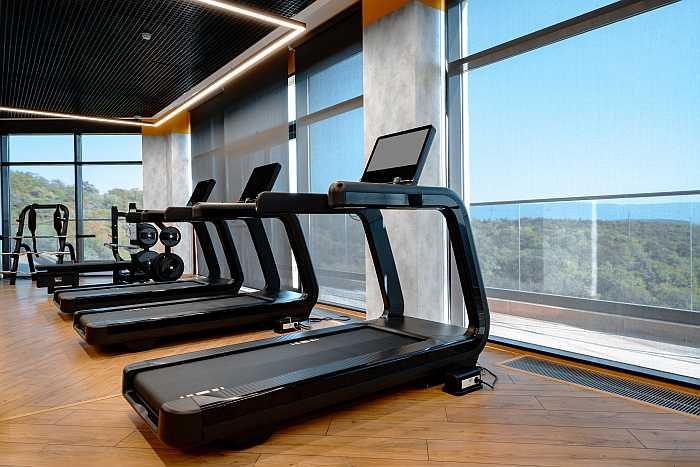
Photo: Envato
Welcome to the world of Passover programs – an experience as rich in culinary delights as it is in cultural and spiritual significance. Each year, as families and individuals gather in these luxurious settings to commemorate Passover, they are greeted not just with the traditional retelling of ancient stories, but also with an abundance of food choices that span vast buffets and round-the-clock tea rooms.
While Pesach programs offer an opportunity to celebrate Passover without the hassle of cleaning, shopping and preparing meals, they also present a unique challenge: maintaining a balance between the joyous indulgence of the holiday and the equally important aspect of health and wellness. In an environment where delicious options are always at arm's reach, how do we navigate our choices to ensure that our celebration is not just memorable, but also mindful of our health and wellbeing?
In this blog, we'll explore just that. Whether you're someone who frequents Passover programs or are planning to experience one for the first time, this guide is designed to help you savor the festivity without compromising on your health goals.
Understanding the Passover Program Dining Experience
When you step into a hotel for a Passover program, you're entering a world where the dining experience is designed to be as enriching and diverse as the holiday itself. The structure of meals in these programs is thoughtfully curated to cater to the festive spirit of Passover while also ensuring that guests are well-fed and satisfied throughout their stay.
Typically, the day in a Passover program begins with a hearty breakfast. This meal often features a range of options, from traditional favorites to contemporary, health-conscious choices. It's the perfect start to a day filled with celebration and reflection.
As the day progresses, lunch is served. This midday meal tends to be a lighter affair compared to dinner, but it is by no means less varied or satisfying. The options here are plentiful, ensuring that every palate is catered to.
The culinary climax of the day is undoubtedly the dinner. Here, the buffets spread out in their full glory, showcasing an array of dishes that pay homage to traditional Passover cuisine while also embracing modern culinary trends. It's a feast for the senses and a true testament to the holiday's abundance.
In addition to these three staple meals, many programs also feature a tea room that's open throughout the day. This ever-tempting corner is a hub for snacks, treats, and beverages - a constant invitation to indulge.
However, with this abundance comes a challenge, particularly for those mindful of their health and wellness. The sheer variety and availability of food can make it easy to overindulge, leading to potential health setbacks. Yet, within this challenge lies an opportunity - the opportunity to practice mindful eating, to make conscious food choices, and to listen to our bodies.
In the upcoming sections, we'll delve into strategies and tips for making the most of the Passover program dining experience, ensuring that you can enjoy the holiday's culinary offerings without compromising on your wellness goals.


Photo: Envato
Strategic Meal Planning
Embarking on your Passover program with a strategic meal plan is like navigating a delightful maze with a well-drawn map. It's about making choices that satisfy both your taste buds and your health needs. The key is to find a harmonious balance between nutrition and indulgence, ensuring that you can enjoy the bountiful feasts without straying from your wellness path.
1. Start Your Day with a Balanced Breakfast: Breakfast sets the tone for your day. Opt for a mix of protein, healthy fats, and carbohydrates. Think egg whites, fresh fruits or yogurt. This balanced approach kick starts your metabolism and gives you sustained energy for the day ahead.
2. Light and Satisfying Lunch: Lunch during Passover programs can be tempting with various options. Aim for a lighter meal, perhaps a salad with a good protein source, to keep you fueled but not overly full. This way, you're not only eating healthily but also leaving room to enjoy the more elaborate dinner offerings.
3. Dinner - The Art of Selection: Dinner buffets are a showcase of culinary excellence and the biggest test of your meal planning strategy. Here's how to approach it:
- Survey Before You Serve: Walk through the entire buffet before picking up your plate. Identify healthy options and dishes you really want to try.
- Portion Control: Start with small portions. This way, you can sample a variety of dishes without overeating.
- Vegetables are Your Friends: Fill half of your plate with vegetables. They are not only nutritious but also help you feel full with fewer calories.
4. Revisiting for Seconds: A Mindful Approach
- Wait Before Going Back for Seconds: Give yourself a chance to digest and assess if you're truly still hungry.
- Choose Different Items: If you do go back, try different dishes from your first round to diversify your meal experience.
5. Navigating the Tea Room: The tea room, with its array of snacks and treats, requires a mindful approach. Indulge in a small treat or pick healthier options like nuts or fruit if available. Remember, moderation is key.
6. Hydrate Wisely: Amidst the eating, don’t forget to stay hydrated. Opt for water or herbal teas over sugary drinks. Staying hydrated helps regulate your appetite and maintain energy levels.
7. Listen to Your Body: Pay attention to hunger and fullness cues. Eating slowly and mindfully helps you enjoy your food and recognize when you are satisfied.
By planning your meals thoughtfully and being mindful of your choices, you can navigate the Passover program's dining experience with ease and enjoyment. It's all about savoring the flavors of the holiday while nurturing your body and health.

Photo: Envato
Addressing Specific Dietary Needs
Passover can be challenging for those with food allergies and specific dietary needs. In a hotel setting, where meals are pre-planned and served buffet-style, navigating these needs requires a bit of foresight and communication. Whether you're gluten-free, low-carb, or have other dietary restrictions, there are ways to ensure your needs are met without compromising the joy of the holiday.
1. Pre-Arrival Communication is Key:
- Inform in Advance: Reach out to the program coordinators well before your arrival. Provide them with detailed information about your dietary restrictions and any potential cross-contamination concerns.
- Seek Confirmation: Ensure that the program acknowledges your needs and has the means to accommodate them. Don’t hesitate to ask for specifics about how they handle special diets.
2. Be Informed About Menu Options:
- Request Menus in Advance: If possible, ask for the Passover program’s menu ahead of time. This allows you to plan your meals and identify which dishes will be suitable for you.
- Look for Labels: Many hotels label dishes that cater to specific dietary needs. Always check for these labels when approaching the buffet.
3. During Your Stay: Maintaining Your Diet
- Communicate with Staff: Upon arrival, introduce yourself to the dining room manager or chef. A face-to-face conversation can ensure that your needs are fresh in their mind.
- Be Specific and Polite: Clearly and politely reiterate your dietary needs to the serving staff. They are there to help, and clarity can prevent any misunderstandings.
4. Navigating the Buffet:
- Identify Safe Foods: Stick to foods you know are safe for your dietary requirements. When in doubt, don’t hesitate to ask the staff about ingredients.
- Watch for Cross-Contamination: Be mindful of how food is served. Utensils used for different dishes can be a source of cross-contamination.
5. Have a Backup Plan:
- Bring Some Essentials: Packing a few non-perishable items that meet your dietary needs can be a lifesaver in situations where options are limited.
6. Focus on What You Can Enjoy:
- Embrace the Experience: Focus on the variety of foods you can enjoy. Passover programs often offer a wide array of dishes, and there’s likely to be plenty that you can relish.

Photo: Envato
Incorporating Physical Activity
While the Passover program is undoubtedly a time for spiritual and culinary indulgence, it's also an excellent opportunity to integrate physical activity into your holiday routine. Staying active not only complements the festive feasting but also contributes significantly to your overall health and well-being. Even amidst a packed schedule and the comforts of a hotel setting, there are ample ways to keep moving and stay energized.
1. Exploring Hotel Amenities:
- Utilize the Hotel Gym: Most Passover program hotels have a fitness center so take advantage of it. Even a short workout can invigorate your body and mind.
- Swimming for Fitness: Many hotels offer swimming pools. Swimming is a great low-impact exercise that works your whole body.
2. Creative Room Workouts:
- Bodyweight Exercises: Utilize the space in your hotel room for bodyweight exercises like push-ups, sit-ups, squats, and lunges. These exercises require no equipment and can be quite effective.
- Yoga and Stretching: Start your day with a yoga session or some stretching exercises. This can be particularly refreshing and helps maintain flexibility. There are some great videos on YouTube, such as yoga with Adriene (I’m a huge fan).
3. Outdoor Activities:
- Walking Tours: Participate in any walking tours offered by the Pesach program or simply take a walk around the area. Walking is excellent cardiovascular exercise and a great way to explore your surroundings.
- Find Nearby Trails or Parks: If the hotel is close to trails or parks, consider going for a jog or a brisk walk in nature.
4. Integrating Activity into Daily Routine:
- Take the Stairs: Opt for stairs over elevators whenever possible. It’s an easy way to sneak in some extra physical activity. I try to do this all year long.
- Stretching Breaks: Incorporate short stretching or walking breaks between meals and activities. This helps keep your metabolism active and prevents you from feeling sluggish.
Physical activity doesn't have to be a chore or a significant time commitment, especially during your Pesach vacation. By finding creative ways to integrate exercise into your day and making use of the facilities and surroundings, you can maintain a healthy balance between enjoying the holiday feasts and keeping your body active and engaged.


Photo: Envato
Conclusion
The key to maintaining your health and wellness at Passover programs is finding balance. While these programs offer a unique blend of cultural, spiritual, and culinary abundance, they also provide an opportunity to be mindful of your health and dietary choices.
By strategically planning your meals, making smart choices at the buffet, addressing specific dietary needs with care, and incorporating physical activity into your routine, you can fully embrace the Passover celebration in a way that honors both our traditions and our well-being.
As you embark on your Passover program, remember that each choice you make is an opportunity to nurture your body, mind, and spirit. Enjoy the festive meals, engage in the spiritual essence of the holiday, and take care of your well-being, making this Passover a truly holistic and enriching experience.